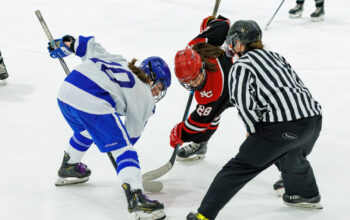
Doug Reilly
Reporter
Although the football program may be infamous outside NCHS for its success year after year, here it is known for long, tough practices throughout the week and longer, tougher practices before the season starts.
In many high school sports, long hours of practice and workouts are not the only thing that student athletes do to prepare for their respective sports. Many people don’t realize that for several sports-including wrestling and crew, among others-athletes have to diet in order to fit certain weight restrictions associated with some leagues and sports.
Weights are particularly essential in wrestling due to the many weight classes. A wrestler’s weight is equally important as the skills he possesses. Coaches often tell the wrestlers to gain or lose anywhere between one and ten pounds.
“A coach usually asks you to gain weight in the off season by lifting and trying to throw on muscle,” senior wrestling captain Joel DeMarco said. “I’m usually asked to lose weight as the season approaches and as it starts in order to be as strong as possible for the lowest weight.”
Similarly, for crew, rowers are typically asked gain or lose weight before a weigh-in at a race. The weight of the athlete is also very important in crew because they benefit from being stronger at a lighter weight. “It’s worse for the lightweights who have to stay under a certain weight because they have to find a balance in their training to get maximum performance with minimum weight,” senior crew captain Charlie Kelly said.
How an athlete gains or loses the amount of weight requested by the coaches varies by sport. “To gain weight I lift about four or more times a week, usually higher weight with lower repetition,” Joel said. “I eat a lot of healthy protein and usually take some supplements with protein and creatine.”
Charlie takes a different dietary approach. “Personally, I don’t like the idea of protein shakes or any kind of supplement,” he said. “I just eat a lot of food at every meal and try to make sure at least one meal is high in protein. Packing calories is important. I burn at least 2000 calories at practice, so I eat 6000 a day.”
In some cases, however, excess calories are not beneficial. “To lose weight I stop lifting as much and switch down to lower weight with higher reps,” Joel said. “I also cut down my calorie intake a lot and try to eat green vegetables and white meats.”
Sophomore wrestler Dylan Leeming elaborated. “Most [wrestlers]who have to lose five or more pounds and maintain that weight will just eat healthier foods and smaller quantities and just workout more,” he said.
Some athletes pursue weight loss in more extreme ways, as well. “I know some lightweights who will wrap their bodies in saran wrap while they’re on the rowing machine to sweat and lose water weight before their weigh-in at a race,” Charlie said.
In both wrestling and crew, weigh-ins before races or matches are critical to the team’s success, making the weight of the athletes even more important. Even one tenth of a pound overweight or underweight can alter the approach a coach and team makes going into the event. When the weight can’t always be completely gained or lost, coaches and teammates may occasionally go to great lengths to get to that desired weight.
“At nationals last year, a girl was 0.2 kilograms overweight for her weigh-in, so her coach literally cut off all her hair on the spot and she made weight,” Charlie said.

